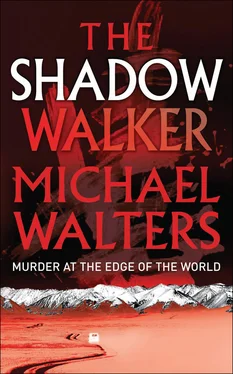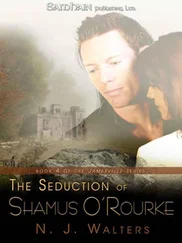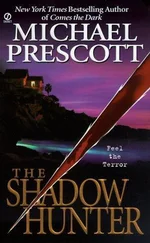Michael Walters - The Shadow Walker
Здесь есть возможность читать онлайн «Michael Walters - The Shadow Walker» весь текст электронной книги совершенно бесплатно (целиком полную версию без сокращений). В некоторых случаях можно слушать аудио, скачать через торрент в формате fb2 и присутствует краткое содержание. Жанр: Полицейский детектив, на английском языке. Описание произведения, (предисловие) а так же отзывы посетителей доступны на портале библиотеки ЛибКат.
- Название:The Shadow Walker
- Автор:
- Жанр:
- Год:неизвестен
- ISBN:нет данных
- Рейтинг книги:3 / 5. Голосов: 1
-
Избранное:Добавить в избранное
- Отзывы:
-
Ваша оценка:
- 60
- 1
- 2
- 3
- 4
- 5
The Shadow Walker: краткое содержание, описание и аннотация
Предлагаем к чтению аннотацию, описание, краткое содержание или предисловие (зависит от того, что написал сам автор книги «The Shadow Walker»). Если вы не нашли необходимую информацию о книге — напишите в комментариях, мы постараемся отыскать её.
The Shadow Walker — читать онлайн бесплатно полную книгу (весь текст) целиком
Ниже представлен текст книги, разбитый по страницам. Система сохранения места последней прочитанной страницы, позволяет с удобством читать онлайн бесплатно книгу «The Shadow Walker», без необходимости каждый раз заново искать на чём Вы остановились. Поставьте закладку, и сможете в любой момент перейти на страницу, на которой закончили чтение.
Интервал:
Закладка:
The pathologist had concluded that, in fact, all this mutilation had occurred after death. The most likely cause of death itself was strangling or asphyxiation. There was little other visible evidence. The body was dressed in Western-style clothes-cheap pants, a thin cotton shirt, a rough jacket. Apart from the tearings and blood stains, the clothes were clean and looked new. They were mass-produced items that could have been purchased anywhere although this late in the year, it was difficult to imagine that anyone had willingly gone outside dressed like that. The pockets were empty.
The local police had, characteristically, stumbled into the incident more or less by accident. A passing patrolman, shining his flashlight down the side street, had been startled by the scene-the twisted body, the prone drunk. His first reaction was to call for backup, and then to apprehend the still retching drunk who had offered little resistance.
It was a natural assumption. Most deaths and criminal injuries in the city were the result of drunken brawls. But a moment’s glance at the corpse had been enough to tell the patrolman that, though the drunk might be a witness, he was unlikely to be the perpetrator. There was little blood surrounding the body, and it was clear that the murder and dismemberment had taken place elsewhere and sometime before.
Apart from the additional lacerations, the murder had all the signs of a professional killing. The removal of the head and hands had presumably been intended to conceal the victim’s identity, the clothes had been stripped of identifying marks. The body had been dumped here, in the dark but just off the main drag, so there had been no concern about its being found. It might even be that the discovery of the body, and its inevitable reporting in the media, was intended as a warning to someone.
The murder might have been committed for any number of reasons. The drugs trade had made its inroads here as it had in most impoverished Soviet satellites, especially among the younger unemployed. There were the usual networks of organized crime-much of it with its roots over the borders in China and Russia but gaining an ever-stronger foothold in the capital. This was a country with no money but plenty of potential. The perfect buyer’s market for anyone looking to get a piece of the future action.
And, of course, there was no shortage of homegrown corruption. It was only a few years since the Mon-Macau Casino scandal had resulted in the trial and imprisonment of a prominent group of politicians on bribery charges. And that case had been just one high profile example of what was becoming an endemic problem-a seeping corruption evident in all parts of public life. Even, as he knew only too well, among the police themselves.
The police would make a show of investigating, but they would probably make little progress. For all its horror, this was the kind of crime that wouldn’t justify much investigative time; the chances of resolving it were too small and it was in nobody’s interest to dig too deeply. And even the most honest policemen might think that the victim, whoever he might be, probably deserved his fate. Which, Nergui conceded, could well be the case.
So, after a small flurry in the press, the case aroused little interest. Nergui had the details logged in the Ministry files on the off chance there was some connection to any of the fraud or other cases they were already investigating, but he didn’t seriously expect any link, he had already dismissed the murder as just another manifestation of the criminal underclass that infested this city.
And then, a week later, they found the second body.
“You are something of an expert in this field, I understand?” Nergui said. Outside, the night and guttering lights rolled past them as the car entered the city outskirts. The heavy industrial sites gave way to row after row of featureless low-rise apartment buildings, a familiar testament to ugly Soviet pragmatism. Most looked neglected, paint peeling, the occasional window smashed. But virtually all seemed to be inhabited-there were lights at the windows, occasional lines of washing hanging limply in the cold evening.
Then, unexpectedly, in an open space between the tightly packed apartment blocks, there was another clustering of gers , a nomadic camp somehow lost in the urban anonymity. Drew stared out at the neat lines of identical round gray tents, the smoke rising steadily from their central chimneys. There were ranks of old-fashioned, brightly polished Russian motorbikes and a lone tethered horse, its breath clouding the night in the pale orange of the streetlights. As if to compound the incongruity, a group of denim-clad teenagers stood chatting around a single streetlight in the heart of the camp, cigarettes glowing in their hands, as though transported there from some Western inner city.
He looked back at Nergui. The Mongolian was watching him closely, as though his response might be significant. Nergui’s face remained expressionless, his flat features and dark skin looking almost as if they might be carved from wood.
“That would be an exaggeration,” Drew said. “But I’ve had to deal with a lot of violent crime. Including murder.”
“Serial killings?”
“It depends what you mean. I handled one case where we had a genuine psychopath. He killed twice before we got him, but if we hadn’t I don’t doubt that he’d have killed more. And I’ve handled several multiple killings, but those were mostly professional hits.”
Nergui nodded. “Which may be what we have here.”
“I wouldn’t like to speculate,” Drew said. “From what I’ve read, the whole thing is just-well, bizarre. It doesn’t sound like the random killings of a psychopath, but it’s a strange way to organize any kind of professional hit.”
“Yes, indeed,” Nergui said. “Well, we welcome your help. And we will do all we can to reciprocate. We understand that this matter is a concern to both our countries.”
In truth, it wasn’t clear why Drew had been sent here. It was not unusual, when a serious crime had been committed against a British subject, for an investigating officer to be sent to work with the local police. Often, it was little more than a token gesture, a demonstration to the public that the matter was being taken seriously. This was probably the case here. The brutal murder of a British businessman in a remote and largely unknown country was always going to create a stir in the tabloids, even though the full details of the murder had not been released.
The victim had been a Manchester resident, and Drew, as one of the more experienced investigating officers, had been offered the opportunity to make the trip. It was a difficult offer to refuse, although Drew could see little that he could bring to this particular party. Investigating any crime, even murder-especially murder-was generally a matter of routine, of systematically exploring every avenue, sifting each bit of information, until you began to make the connections. There was little doubt that Nergui and Doripalam would be organizing that side of things very efficiently. Drew might facilitate some contacts in the UK, if there turned out to be any significance in the last victim’s identity, but that was probably about it.
They had now entered the city center. The road widened into a brightly lit avenue, lined with a mix of official-looking buildings, many studded with communist emblems, and newer commercial offices, some with Korean, Japanese or even American business names that Drew recognized. This could be any Eastern European city struggling to come to grips with life after the Soviet Union-the first shoots of Western capitalism alongside drab weathered concrete, poorly maintained roads and streetlights, shabby squares and inner-city parks. Familiar logos, neon lit on the summits of office buildings, competed with stylized images of soldiers and stars-the fading murals of communism. And then, off to the right, there was a sudden glimpse of a very different building, the monastery of Choijin Lama, palely illuminated against the dark sky-a jumble of curving gilded rooflines, copper and crimson colorings, towers and short golden spires.
Читать дальшеИнтервал:
Закладка:
Похожие книги на «The Shadow Walker»
Представляем Вашему вниманию похожие книги на «The Shadow Walker» списком для выбора. Мы отобрали схожую по названию и смыслу литературу в надежде предоставить читателям больше вариантов отыскать новые, интересные, ещё непрочитанные произведения.
Обсуждение, отзывы о книге «The Shadow Walker» и просто собственные мнения читателей. Оставьте ваши комментарии, напишите, что Вы думаете о произведении, его смысле или главных героях. Укажите что конкретно понравилось, а что нет, и почему Вы так считаете.












